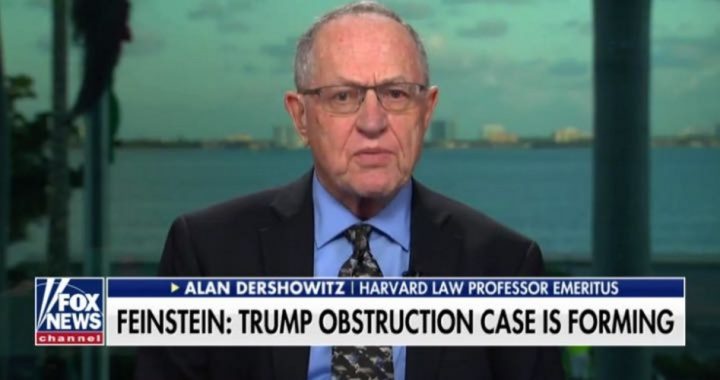
“Senator Feinstein simply doesn’t know what she’s talking about when she says it’s obstruction of justice to do what a president is completely authorized to do under the Constitution,” Harvard Law School professor emeritus Alan Dershowitz declared, in a sharp rebuke of the California Democrat during his Monday interview on Fox and Friends.
Feinstein had told Meet the Press on Sunday that the Senate’s investigation into Russia’s alleged meddling in last year’s presidential election has revealed possible obstruction on the part of President Donald Trump. “I see it in the hyper-frenetic attitude of the White House, the comments every day, the continual tweets,” Feinstein said. “And I see it most importantly in what happened with the firing of Director [James] Comey, and it is my belief that is directly because he did not agree to ‘lift the cloud’ of the Russia investigation. That’s obstruction of justice.” (Emphasis added.)
Dershowitz, however, had a totally opposite position. His disagreement with Feinstein is significant not just because he is a highly regarded retired law professor, but also because he is a life-long partisan Democrat. He stated, “I think if Congress ever were to charge [Trump] with obstruction of justice for exercising his constitutional authority under Article II, we’d have a constitutional crisis.”
He added, “You cannot charge a president with obstruction of justice for exercising his constitutional power to fire Comey and to tell the Justice Department who to investigate and who not to investigate.”
Dershowitz buttressed his position with historical examples, going back to President Thomas Jefferson’s pursuit of former Vice President Aaron Burr early in the 19th century. More recently, Dershowitz noted, “George Bush, the first, pardoned Caspar Weinberger in order to end the investigation that would have led to him,” and “nobody suggested obstruction of justice.”
For there to be an actual case of obstruction of justice, either Congress or the courts would have to demonstrate “clearly illegal acts” on the part of Trump. Dershowitz offered as an example former President Richard Nixon paying “hush money,” telling people to lie, and destroying evidence during the Watergate scandal of the 1970s. He added that even with former President Bill Clinton, “They said he tried to influence potential witnesses not to tell the truth. But there’s never been a case in history where a president has been charged with obstruction of justice for merely exercising his constitutional authority.”
Because of this, Dershowitz expressed hope that Robert Mueller, the special counsel charged with investigating the alleged collusion with the Russians, will refuse to press charges against Trump. “That would cause a constitutional crisis in the United States, and I hope Mueller doesn’t do that.”
Dershowitz also insisted that Trump has every right to ask members of Congress to wrap up their investigation. Of course, Congress also has the right to ignore such a presidential request, under the doctrine of separation of powers, he added.
Some have cited Judge Andrew Napolitano’s comments on the Fox News program America’s Newsroom as contradicting Dershowitz’s remarks. Napolitano argued that if Trump asked Comey to end the investigation for some non-corrupt reason (such as he believed the bureau should use its resources on what he considered something more important), then that would not be obstruction.
On the other hand, Napolitano said, if Trump was trying to protect his son-in-law Jared Kushner from what former National Security Adviser Michael Flynn might say, then that would constitute obstruction of justice. “Obstruction of justice is a crime no matter who commits it, if done for a corrupt purpose. It’s also an impeachable offense,” said Napolitano, but he admitted it is “not easy to prove.”
But Dershowitz had a different take on Flynn’s potential testimony, noting that Mueller had charged Flynn with lying to the FBI. “The deal is not a particularly good one for the special counsel, because he had him indicted for lying. That makes him a worthless witness.” In other words, if Flynn is a liar, who is to say he would not be lying if he took a deal from the special counsel in exchange for testifying against others, such as Trump or his son-in-law?
Dershowitz actually saw the fact that Trump had not pardoned Flynn as a strong argument against Trump having committed obstruction of justice. This would have prevented General Flynn from cooperating with Mueller’s investigation. “The president would have had the complete authority to do so and Flynn never would have been indicted, never would have turned as a witness against him,” said Dershowitz.
Moreover, as we pointed out in our article about Flynn, “Flynn Plea Deal: Proof of Collusion? Not Even Close,” Flynn has admitted to having lied about having had contact with the Russians after the election, not before the election. His contacts with the Russians were not only not illegal, they were intended to reduce international discord with Russia, discord intentionally caused by Obama right before he left office, and they were the type of thing that incoming presidential administrations commonly do. He is in trouble simply for lying, something no one wants to bother Hillary Clinton with after the many lies she told during investigations into using her private e-mail for State Department business.
Image of Alan Dershowitz: Screenshot from Fox Interview



